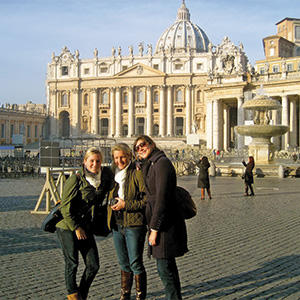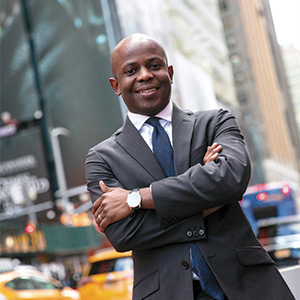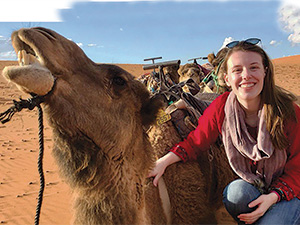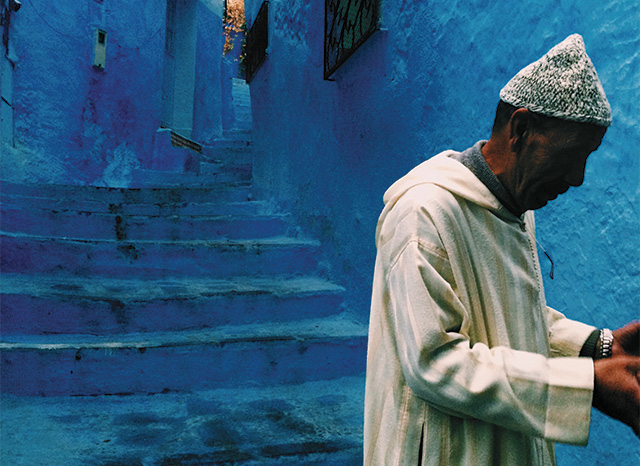Pulteney Street SurveySpring 2019

Photo by Mike Goulart '20
Outside the Bubble
As the idea picked up steam, "some of the faculty used our own connections abroad to get programs going," says Interim President Patrick A. McGuire L.H.D. '12, who led his first term abroad to London in 1980 with Professor Emeritus of Political Science Joseph DiGangi. Those relationships fostered "high standards in the classroom and great cultural exchange," McGuire says, "and as the structure has expanded and become increasingly professional, our partnerships with universities allow us to target what we want students to gain from the experience and what we need to prepare them for."
Programs and participation grew through the 1980s and 1990s, fueled by student interest and driven by HWS faculty and the early leaders of what would become the Center for Global Education (CGE). As the Colleges refined the study abroad model, the immersive coursework and cultural exchange of those early years became the foundation of today's programming.
"Living abroad, for even as short as three months, you get a much bigger view of the world," says Chapin Bates '81, P'09, P'12. After spending a term in London with McGuire and DiGangi, he returned the following year to help administer the program led by Professor of Sociology Jack Harris P'02, P'06 and Professor Emerita of English Claudette Columbus.
Bates, who later worked in the London banking sector and is now executive vice president at Citizens Bank in New York, says that from the literary and artistic history on the Isle of Wight to the Findhorn eco-village in northern Scotland, studying abroad "opened us up to different aesthetics, different mindsets, different ways of building a community."

Years later, when Bates' daughter Mary Kate Miranowski '09 studied in Rome, she found that exposure to those differences "makes you more self-aware. A big part of understanding different cultures and different ways of life is knowing that where you come from is just one small part of the world."
Miranowski, a divisional merchandising manager at J. Crew, notes that "when I'm hiring people, I'm looking for that kind of perspective." (Photo: Mary Kate Miranowski '09, Caroline M. Monahan '09 and Samantha J. Schraeter '09 in Rome.)
Associate Professor of Classics James Capreedy, who led the fall 2018 program to Rome, says that "if the goals of HWS are for students to become more aware, to have the courage to be autonomous, to have empathy, and to think and act with an ethical and moral mind, then being in a foreign country ... is a perfect way to develop these skills."
Those goals have guided the Colleges' academics for generations, so the fact that their pursuit in new global settings has become "a defining part of the HWS experience," as Professor Emerita of History Susanne McNally says, maybe shouldn't be surprising.
"It is difficult to cultivate really serious global citizenship, even with firsthand experience," she says. "Without it, it's almost impossible."
In 1983, McNally and her then-husband Charles, who helped establish and lead the nascent global education program, organized one of the first U.S. undergraduate abroad programs to China with the late Professor of Art John Loftus P'75, P'76, P'91.
At the time, the Colleges had recently added Chinese to the on-campus language course offerings, and for Russell Kaltschmidt '84, who designed his own major in East Asian studies, the term abroad in Beijing was "the culminating experience for my time at HWS."
As part of their course at the Beijing Foreign Languages Institute, students were paired with Chinese "language partners," an experience that provided "great inroads into the culture," says Kaltschmidt, now a theater director, producer and learning and leadership consultant based in San Francisco and New York.
"I was fascinated by what the people of China had gone through after World War II and since the revolution," he says. He describes the "cultural pull" he observed between "experts," who "embraced science and technology and what the world had to offer beyond China," and "reds," who held a more inwardlooking Maoist worldview. "My language partner was much more red," he recalls, "and my roommate was on the other end of the spectrum. Between their clothes and haircuts and how they carried themselves, it was almost night and day."
In their sessions, "being able to study a language and then use it to have this really meaningful cultural exchange," Kaltschmidt says he saw how "study and experience come together to awaken global awareness."
Across the breadth of the Colleges' dozens of programs today, "the idea of being present and engaging in your local community is a priority for us," says Dean of Global Education Thomas D'Agostino P'15, who has led CGE since it was established in 2003. "There's a danger of students never getting outside the bubble of other American students, so we've tried to create as many opportunities as possible - through homestays, teaching placements, community service and internships - to break outside that bubble and engage with the local students and other residents."

"Within a semester I feel like I lived a lifetime," says Innis Baah '10 (right), who spent the fall of his junior year studying in Hong Kong. "You grow up having certain images of different people and cultures, and it's an eye-opening experience to get past myths and stereotypes of cultures and develop relationships and build rapport. The language barrier was big, but I joined the school soccer team, I interned with a law office assisting migrant workers, I built connections and I found that I came back more focused and more attentive to people."
The following year, Baah earned a scholarship from the Council on International Exchange Education to travel to Seoul. Seeing the infrastructural growth since North Korea and South Korea split, he says, reignited his interest in his home country of Ghana, which gained independence from Britain in the same era. After graduation, Baah joined Rustic Pathways, leading service-learning programs to Costa Rica and Panama. Since helping establish the organization's Ghana program, he has worked with locals to raise funds and renovate a school and returns at least once a year as he strategizes how his work in the States could boost economic opportunity in West Africa.
Now a senior consultant with Ernst & Young's construction and corporate real estate advisory practice, Baah says that "in all these different places, I was able to discover or do something that inched me one step closer to who I am and what I want to do."
"I think studying abroad helps students to appreciate the nuances of other cultures and acquire a firsthand understanding of the complexities of globalization," says Associate Professor of Political Science Vikash Yadav, who has led abroad programs to Egypt and India. "It is one thing to teach about poverty and development through statistics, for example; it is quite another for students to experience the fractured forms of globalization in urban India through their homestay or while exploring the gullies of an ancient city like Varanasi or the alleys of a special economic zone outside of New Delhi. ... Since many of our students will need to work with and engage their counterparts from Asia professionally once they are in the work world, it is wonderful for them to become accustomed to interacting with foreign cultures now."
Whether though internships or site-based coursework, service learning or living with host families, immersive study abroad programs help students "develop a greater sense of selfawareness, self-confidence and self-sufficiency, while also broadening their perspective on the U.S. and how our country fits within the global context," says CGE Program Manager Anthony Mandela.

During the field-based program in Rabat, Morocco, Elizabeth Dunne '19 not only enriched her Arabic language skills through her homestay, but the Refugee Studies major also visited the United Nations High Commission on Refugees office, "a handson experience [which], married with the theoretical work included in my individual major, has been invaluable."
With a strong background in the theory, "being able to see the people who make the asylum process actually happen was very enlightening," says Dunne, who served as a policy advocacy intern at the Yemen Peace Project, which has promoted advocacy and grant-making programs for the country and its citizens since 2010.

"In the classroom, when students are able to draw on personal experience, they're automatically engaged - they have something to grab on to," says Professor of Geoscience Nan Crystal Arens, who has led field courses in Australia, New Zealand and the Bahamas. "We know from educational research that unless you have that experience, it's really hard to connect with the material. We can read about plastic pollution in the ocean, but you don't truly experience it until you're on the beach and pick it up and feel the weight of it."
As Professor of Sociology Jack Harris P'02, P'06 puts it, "we are a campus that says ideas have consequences. We have these incredible ideas that come out of classes, but it's not enough just to have a good idea. If it's a good idea, you need to act on it, you need to test it. In class, students are reading world literature, learning languages, studying the environment and international politics and economics. And then we say: Go out and test it. Prove the theory. Put it into action."
During the 2019 winter break, Harris led a group of students to a farming village in rural Ghana for an intensive three-week course designed around "asset-based community development," combining sociology, service learning and entrepreneurial studies.
Through a partnership with a nonprofit called ThinkImpact, students enrolled in the course "Social Entrepreneurship" worked with locals "to brainstorm and find new ways to improve the community while living amongst them," says Yalemwork Teferra '21. "Not using their latrines, eating their food, farming, going to church, playing with the kids," all of which helped "build trust with the community so that we could better implement our ideas."
With typical service-oriented abroad experiences, Harris says, "you find a deficitbased approach where people with more resources come and give them to people with less resources. In this case, we help identify assets they have in the community and ideas to make businesses out of them, or to develop associations that improve the social prosperity of the community. We don't go with a particular outcome in mind. What we know is that if we follow a process - immerse, inspire and innovate - we'll find enterprising ideas to develop with our collaborators."
The HWS group and their hosts found that leftover pods from the village's cocoa production could be ground and mixed with starches from plantains and yams to create charcoal that burns hotter, cleaner, longer and cheaper than wood. Meanwhile, students worked with a soap maker, midwife, pharmacist, PTA chairperson and village parents to organize a sanitation campaign and handwashing station at the local school. Others collaborated with local seamstresses to develop a bookkeeping system to track and maximize profits.
An economics and international relations double major, Teferra says she experienced firsthand "the strength in collectivity and the power in mobilizing a community, which is what I understand as being the bedrock for social entrepreneurship."
